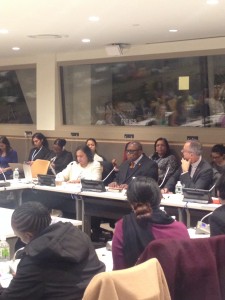The United Nations (UN) held its 59th session of the Commission on the Status of Women (CSW) last week in New York—welcoming government and NGO representatives from all regions of the world. CSW59 focused its efforts on gender equality and empowerment of women and marks the 20th anniversary of the historic Beijing meeting.
Arogya World was invited to partner with the Permanent Missions of the Caribbean Community to the UN (CARICOM) and the NCD Alliance to host a side event, “Realizing Gender Equality: Addressing Non-communicable diseases, disabilities, and discrimination,” on March 16 at CSW to call attention to non-communicable diseases (NCDs) and gender equality. The panel discussion, led by Dr. Gustavo Gonzalez-Canali from UN Women, stitched together disability, discrimination, and the impact of NCDs on women.
NCDs are the leading cause of mortality worldwide, and the number one cause of death among females. NCDs—primarily cardiovascular disease, diabetes, cancers, and chronic lung disease—kill approximately 18 million women each year. According to the World Health Organization, 82 percent of female premature mortality in 2012 was attributable to NCDs. In addition to unacceptably high rates of mortality, NCDs are responsible for approximately 50 percent of all global disability. And, women often shoulder the social and economic burdens that result from being the primary caregivers for those with NCDs.
Our panelists—including Ambassador Dr. Walton Aubrey Webson, the Permanent Representative of Antigua and Barbuda to the UN—helped establish the interconnectedness of NCDs, disabilities, and gender equality. Catharine Taylor from Management Sciences for Health, who was representing the NCD Alliance, pointed out that there is a big difference between men and women in how NCDs affect them—the effect of NCDs is not gender neutral. Daniela Bas, Director of the UN Division of Social Policy and Development, added anecdotal evidence that poor maternal health can lead to challenges that develop into NCDs later in life—underscoring the need for better healthcare and health outcomes for a woman’s entire life cycle, from birth to later years. And acknowledging that there is very little data on the impact of NCDs on women,
Nalini Saligram from Arogya World, shared the findings of our groundbreaking study on women and NCDs, which captured the experiences of 10,000 women in 10 countries around the world.
The room was packed, and the audience asked hard questions, such as “how can I help women in my home country?” Indeed.
The United Nations, in framing the next steps for sustainable development, has dubbed the post-2015 agenda “the world we want.” At our event, and since then, we have been reflecting on how we can ensure that the world we get is “the world we want.” We believe we need to start with women, address their NCD needs, strengthen healthcare systems, and help women everywhere lead healthier lives and prevent NCDs both in themselves and in their families.
We shared two key data points from our survey:
- The financial impact: 25 percent of the women in our survey told us that they spent 1/4 of their household income on NCD treatment and care—and shockingly 7 percent of the women said they spend 50 percent or more of their household income on NCDs. This is unacceptable. We can’t have families spending between 25 and 50 percent of their income treating NCDs. Probing further, we found in our survey of 10,000 women that in the most affected countries, women are paying for healthcare out of pocket—sometimes borrowing from friends and family to do so. This data feeds directly into the argument supporting Universal Health Coverage that is central to the dialogue on health in a post-2015 world.
- The role of caregivers: One half of the women in our study told us that they provided care for someone in their household who had an NCD—and 20 percent of the women surveyed had to quit their jobs to do so. Think about it: half the women in the world are not contributing to the economy, are outside the GDP because they provide unpaid care for someone with an NCD. This issue is something we cannot afford to ignore in the post-2015 world.
These numbers are powerful, but we think it is important to put a human face on the stories these numbers tell. Arogya World showed a short video telling the personal stories of three women and their experiences with NCDs.
In closing, the Ambassador reminded us all of a famous quote: “For he who has health has hope and he who has hope has everything.” We have hope that policymakers from around the world will take notice of our survey findings, heed the discussions and ideas generated at CSW, and take action to provide women worldwide a better chance at health—and hope.

